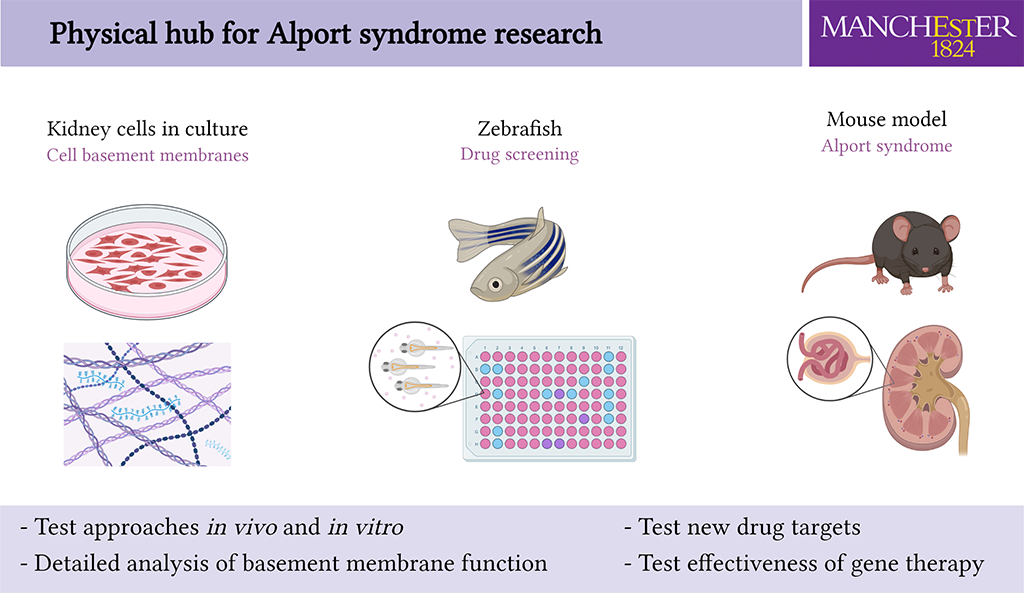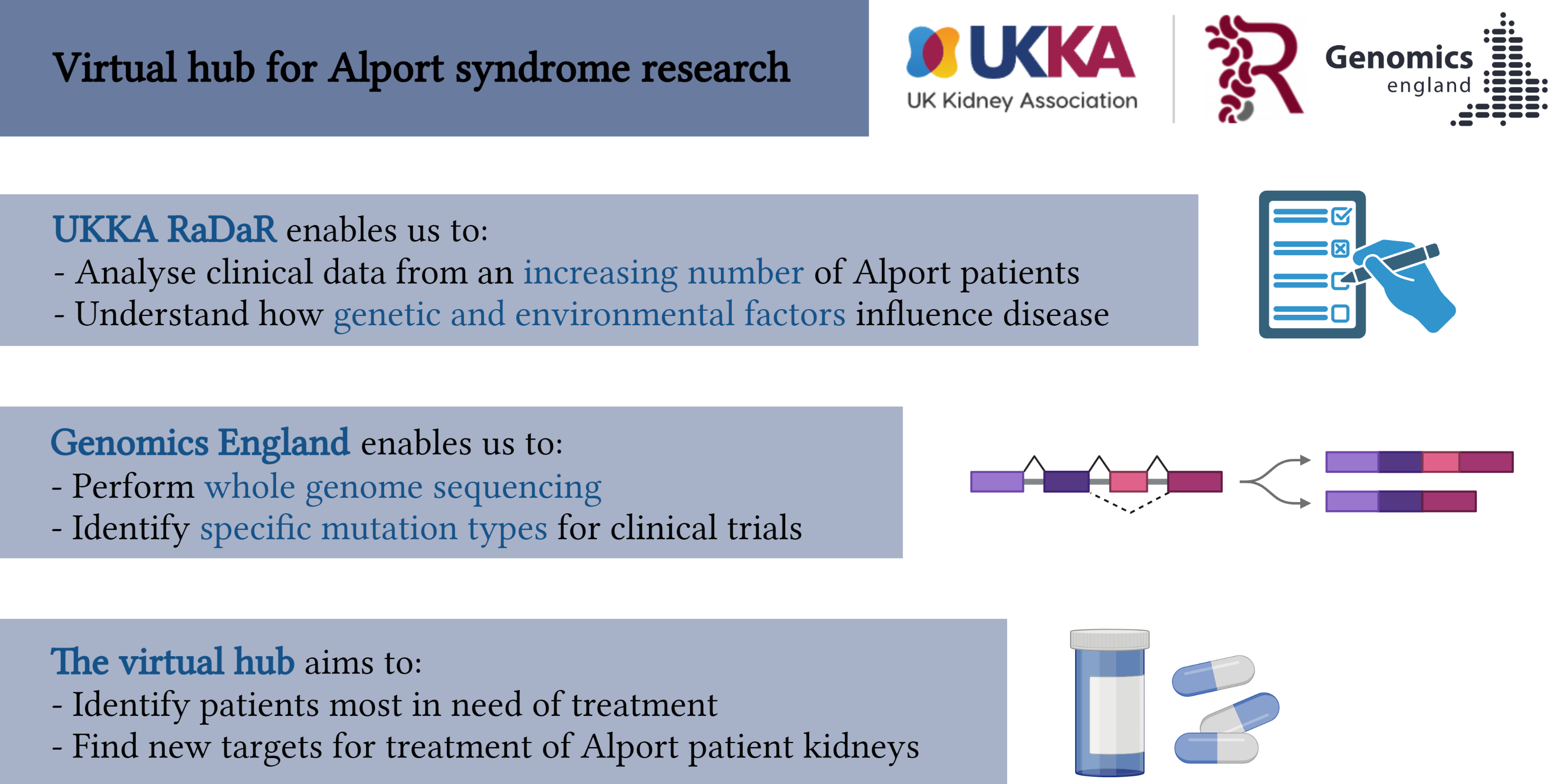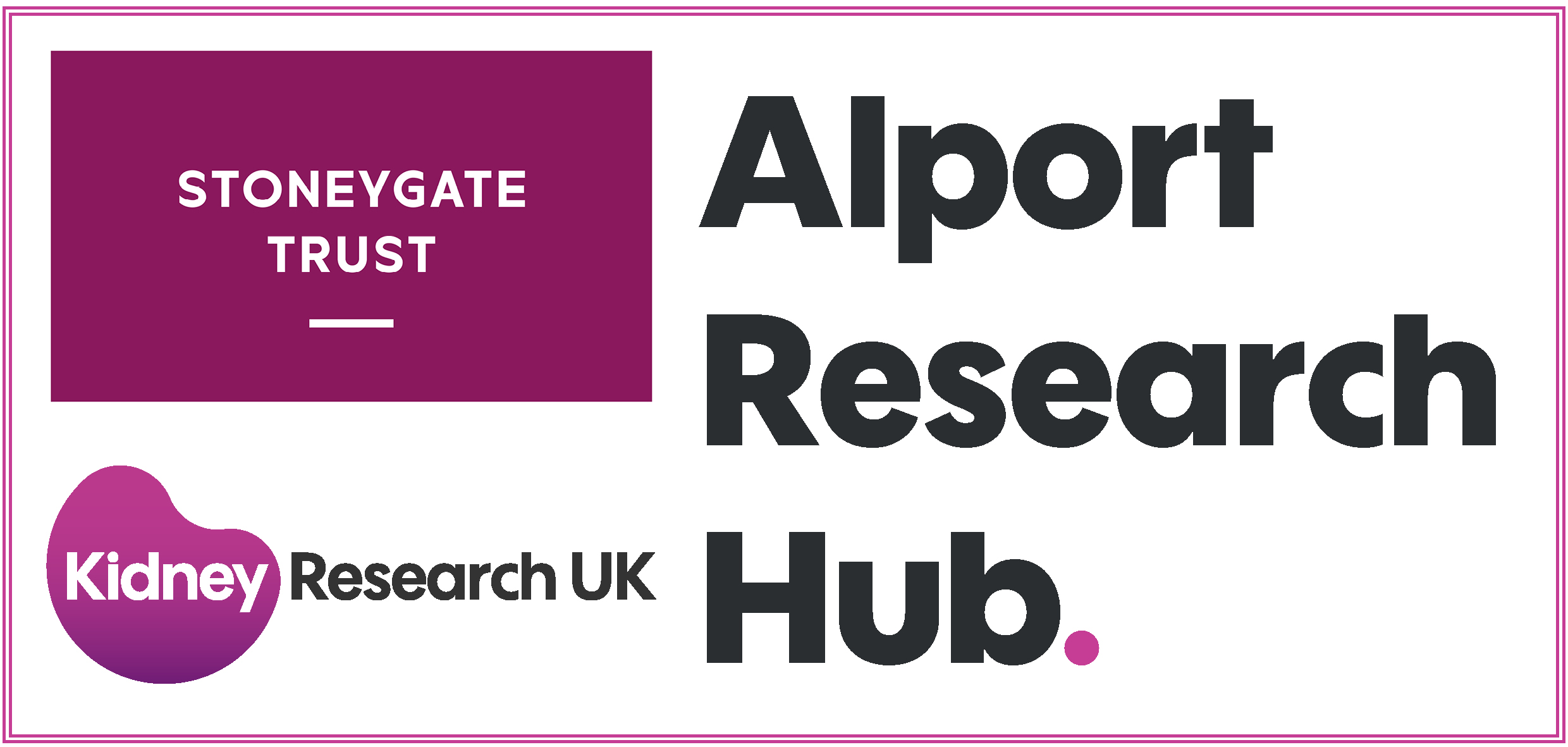Alport syndrome is a rare genetic disorder and the second most common form of inherited kidney disease. This is caused by the genes needed to create a type of collagen that plays a key role in kidney function.
Currently, there is no cure for Alport syndrome. The available treatments aim to slow the progression of kidney disease and to alleviate symptoms. There is a great need for more targeted and effective therapies to treat Alport syndrome.
The Stoneygate and Kidney Research UK Alport Research Hub, was created thanks to a £2.55M investment from Stoneygate Trust in partnership with charity Kidney Research UK, with Alport UK as a collaborator. The hub aims to transform early diagnosis and specific treatments for patients with Alport syndrome.

About Alport syndrome
Alport syndrome is a genetic condition affecting the function of the kidneys.
It can also cause problems with people’s hearing and sight, because the genetic defects are in the formation of a type of collagen fibre known as collagen IV, which is found in the kidneys, ears and eyes.
What is the Stoneygate and Kidney Research UK Alport Research Hub?
The Stoneygate and Kidney Research UK Alport Research Hub aims to accelerate the discovery and translation of research findings into improved clinical interventions. We also work to enhance the existing collaborative network to raise the profile of Alport syndrome research within the UK and globally.
We want to:
- improve the understanding of disease mechanisms in Alport syndrome;
- identify genetic and clinical risk factors for more severe forms of the disease;
- drive robust preclinical testing of new treatments for Alport syndrome.
Our hub will do this through activities at a physical hub in Manchester, and via a virtual hub focusing on data analysis and sequencing.
Physical hub
The physical Alport Research Hub is based in the Wellcome Centre for Cell-Matrix Research at The University of Manchester and is led by Rachel Lennon.
It offers:
- established models of Alport syndrome in kidney organoids (cell basement membranes) zebrafish (drug screening) and mouse models (Alport syndrome);
- state-of-the-art in vivo and in vitro approaches with advanced imaging;
- detailed analysis of basement membrane function;
- a platform for the screening and testing of existing drugs, gene therapy effectiveness or potential new targets.
Systems used to investigate Alport syndrome

These systems allow us to run tests in vitro and in vivo, carry out detailed analysis of basement membrane function and test new drugs and gene therapies.
Virtual hub
The virtual hub is run by Daniel Gale, Neil Turner and Angela Branson.
The UK Kidney Association RaDaR database will be used to analyse data from Alport patients and help understand how genetic and environmental factors influence Alport syndrome.
In association with Genomics England, whole genome sequencing will be performed on patients’ samples to identify specific genetics changes for clinical trials.

Our aim is to help identify those at greatest risk who most need treatment, and to find new targets for treatments that should protect Alport kidneys.
Hub projects
- Preclinical testing of potential therapies: Working with external collaborators to test new therapies for Alport systems in our range of experimental systems.
- Matrix biomarkers in Alport mice and patients: Aiming to improve the biomarkers we use for monitoring the progression of kidney disease in Alport syndrome.
- Human kidney organoids: How do the kidney filters form? Using human kidney organoids to understand how matrix proteins like collagen help to form the blood filters in the kidney.
More information on our projects will be added to The University of Manchester Research Explorer when available.
New projects are funded by an annual application round, peer reviewed through Kidney Research UK.
The research grant call for 2023 has closed but the next round will open in July 2024.
If you are interested in setting up a new project, please contact Rachel Lennon.

Our team
The Alport Research Hub team comprises colleagues from The University of Manchester, University College London and the University of Edinburgh.
Physical hub
Rachel Lennon
 Rachel is a Paediatric Nephrologist at the Royal Manchester Children’s Hospital and Director of the Wellcome Centre for Cell-matrix Research at the University of Manchester. Rachel leads a research programme on Alport syndrome and is Director of the Alport Research Hub.
Rachel is a Paediatric Nephrologist at the Royal Manchester Children’s Hospital and Director of the Wellcome Centre for Cell-matrix Research at the University of Manchester. Rachel leads a research programme on Alport syndrome and is Director of the Alport Research Hub.
Bernard Davenport
 Bernard is a research technician in Rachel Lennon’s lab and has worked at The University of Manchester since 2008. Bernard’s focus is the preparation, imaging and analysis of samples by electron microscopy.
Bernard is a research technician in Rachel Lennon’s lab and has worked at The University of Manchester since 2008. Bernard’s focus is the preparation, imaging and analysis of samples by electron microscopy.
Maryline Fresquet
 Maryline is a research assistant in Rachel Lennon’s lab and joined the University of Manchester in 2002. Maryline’s particular interests are protein biochemistry, cell biology and kidney matrix.
Maryline is a research assistant in Rachel Lennon’s lab and joined the University of Manchester in 2002. Maryline’s particular interests are protein biochemistry, cell biology and kidney matrix.
Mychel Morais
 Mychel is a Postdoctoral Research Associate in the Lennon Lab (University of Manchester). His main interest is investigating changes in basement membranes during embryonic development and in disease. Mychel’s expertise covers developmental biology, molecular and cellular biology, proteomics, and bioinformatics.
Mychel is a Postdoctoral Research Associate in the Lennon Lab (University of Manchester). His main interest is investigating changes in basement membranes during embryonic development and in disease. Mychel’s expertise covers developmental biology, molecular and cellular biology, proteomics, and bioinformatics.
Pinyuan Tian
 Pinyuan is a Research Associate in Professor Rachel Lennon’s group since 2017. Pinyuan’s research interest is using human stem cells derived kidney organoids to understand kidney development, interrogate basement membrane assembly, and facilitate disease modelling.
Pinyuan is a Research Associate in Professor Rachel Lennon’s group since 2017. Pinyuan’s research interest is using human stem cells derived kidney organoids to understand kidney development, interrogate basement membrane assembly, and facilitate disease modelling.
Emily Williams
 Emily began working at The University of Manchester as an apprentice in 2015 and has worked in the Lennon lab as a research technician since 2021. Emily’s main focus is conducting experiments in vivo.
Emily began working at The University of Manchester as an apprentice in 2015 and has worked in the Lennon lab as a research technician since 2021. Emily’s main focus is conducting experiments in vivo.
Virtual hub
Daniel Gale
 Daniel holds the St Peter’s Chair of Nephrology at University College London. He runs the renal genetics clinical service for North/Central London at the Royal Free Hospital, providing specialist care for families with hereditary kidney problems including complement disorders, polycystic kidney disease, Alport syndrome and other familial disorders. Prof Gale directs the UK Rare Kidney Diseases Registry (RaDaR) and leads a research group studying the genetic and biological mechanisms underlying renal diseases. He discovered the diseases HIF2α erythrocytosis with pulmonary hypertension and CFHR5 nephropathy, which is endemic in Cyprus.
Daniel holds the St Peter’s Chair of Nephrology at University College London. He runs the renal genetics clinical service for North/Central London at the Royal Free Hospital, providing specialist care for families with hereditary kidney problems including complement disorders, polycystic kidney disease, Alport syndrome and other familial disorders. Prof Gale directs the UK Rare Kidney Diseases Registry (RaDaR) and leads a research group studying the genetic and biological mechanisms underlying renal diseases. He discovered the diseases HIF2α erythrocytosis with pulmonary hypertension and CFHR5 nephropathy, which is endemic in Cyprus.
Neil Turner
 Neil is professor of nephrology in Edinburgh. He first researched basement membranes proteins in a lab-based PhD, and later developed special interests in kidney diseases affecting young adults, and particularly in Alport Syndrome. Neil was involved in creating PatientView, which showed live results and info to patients online, and then of Radar, which brings together information and research on rare kidney diseases.
Neil is professor of nephrology in Edinburgh. He first researched basement membranes proteins in a lab-based PhD, and later developed special interests in kidney diseases affecting young adults, and particularly in Alport Syndrome. Neil was involved in creating PatientView, which showed live results and info to patients online, and then of Radar, which brings together information and research on rare kidney diseases.
Angela Branson
Angela’s research career commenced in 2015 with the Clinical Research Network in Manchester where she was responsible for delivering Dementia and mental health research studies in the community. Since 2019, Angela has been the dedicated Clinical Trials Coordinator for paediatric kidney research including supporting and facilitating Alport Syndrome Research with Prof Lennon at Royal Manchester Children’s Hospital.
Contact us
If you have any queries about the Alport Research Hub and our activities, please get in touch.
Physical hub queries
Rachel Lennon (University of Manchester)
Email: rachel.lennon@manchester.ac.uk
Virtual hub queries
Daniel Gale (University College London)
Email: d.gale@ucl.ac.uk
Neil Turner (University of Edinburgh)
Email: neil.turner@ed.ac.uk
Follow us
Twitter: @lennon_lab






